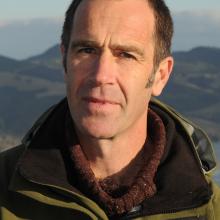It’s time we were thinking about ethical electricity, says Scott Willis.

In my day job, I manage a non-governmental organisation and most of my time is spent working on bringing New Zealand’s first community wind farm to development.
This part of my job has attracted some controversy, as all wind developments tend to. But it has also brought home to me just how challenging the transition to a low-carbon society can be.
The status quo is an attractive thing. We know it. We live it.
Change brings uncertainty and can create anxiety. And the big change of our time, climate change, is happening at a scale and at a speed that, while frighteningly fast in terms of planetary change, is hard for individuals to grasp.
So why change now?
The problem with our attachment to the status quo, is that it just kicks the can down the road to our children. So by the time the can gets to them, it is not just a bit of rubbish, but an avalanche of possibly insurmountable problems.
Technically, the switch to a low-carbon society in New Zealand would be very easy. In terms of electricity, our wind resources are second to none. We have good sunlight hours nationally, and solar (photo-voltaic) panels can even work reasonably well in Dunedin. Our hydro dams provide great storage; they function like giant wet batteries locked in our inland valleys.
And new advances in battery storage and digital technology promise increased flexibility, to enable effective management of the variability of renewable generation.
Jeremy Rifkin, an American author and academic, argues that with our current technical prowess we have the ability to create a new global energy system that is interactive, integrated, and seamless.
He argues that when we embrace a more dynamic, flexible technological basis to our activities, based on electricity, we’ll also stimulate a new economic system.
While his vision is optimistic, it is also achievable at a national level, in New Zealand, with our abundance of wild weather and our particular geography that powers renewables. So why don’t we?
We often hear great statements from friends, family and political leaders about what they intend to do. All of us do the same. Somehow, we often fail to match our actions to our aspirations. And then we make excuses, or find someone else to blame.
But often the disjuncture between practice and aspiration is simply due to a subtle misalignment in a mix of elements, and it might only take a couple of small transformative events for everything to change.
We can’t tell at this point what they might be, but we can look for the signs ...
Today I want to ask: Is it possible that the market could deliver low-carbon results?
A Kiwi company called Ecotricity supplies CarboNZero-certified green electricity right now. The company services about 75% of the country and is operating in parts of Dunedin (in the Aurora Network area).
Its mission statement is all about renewable electricity and electric transport. They see the big picture, and helpfully incorporate buy-back of solar and provide overnight rates that are interesting for people charging their electric vehicles overnight.
Locally, Energy Link’s innovative new "Energy Exchange" to "secure competitive energy auctions for businesses" [ODT August 22, 2016] has the obvious potential to assist businesses source CarboNZero certified green electricity, although the current focus is on achieving cost savings for small businesses.
Energy Link’s innovation is to create an online auction for electricity contracts and so reduce the burden on small businesses.
In Auckland, a company called P2 Power allows peer-to-peer trading.
What does this actually mean?
Peer-to-peer trading means that residents or communities that regularly produce more renewable electricity than they can use, i.e. generation from solar panels or wind turbines, can sell that green generation to other consumers who want local renewable electricity.
They make that work through some clever automation in centralised processing of the retail function. It’s a system that works within the current regulatory system but also is forward looking.
So, all in all, there’s already plenty of innovation in the market, but what about the regulatory environment?
The Electricity Authority is the government agency that is empowered to promote competition in the New Zealand electricity industry for the benefit of consumers.
Back in June, the authority announced a major new work programme looking at "Evolving technologies and business models". They intend to look at ways to make the innovation described above simpler and also look at removing other barriers to mass participation in the electricity market.
Government agencies move slowly, and once internal modelling has been done, the work programme will be evaluated and then, if it passes internal assessment, recommendations will go out to the public and industry for consultation.
Not only is there a long and uncertain development period, there is also no mandate for the agency to prioritise one type of electricity generation over another.
In other words, the market, as currently regulated, can only deliver low-carbon progress, if it can, incidentally.
It still requires us all to become conscientious consumers.
Many of us already make ethical choices in our KiwiSaver provider or in our selection of chocolate, so why not in our selection of electricity? This is the challenge of marrying our actions to our aspirations.
The Government has a target of 90% renewable electricity generation by 2025. Locally, Dunedin has an energy plan that aims to "boost the city’s energy security and ability to adapt to change".
We don’t yet know what these aspirations will look like in the real world, because they remain aspirations. And it is time to act.
A regulatory environment and market with no particular value on low-carbon electricity is unlikely to provide the answers alone.
- Scott Willis is the project manager of Blueskin Energy Ltd. Each week in this column, one of a panel of writers addresses issues of sustainability.













